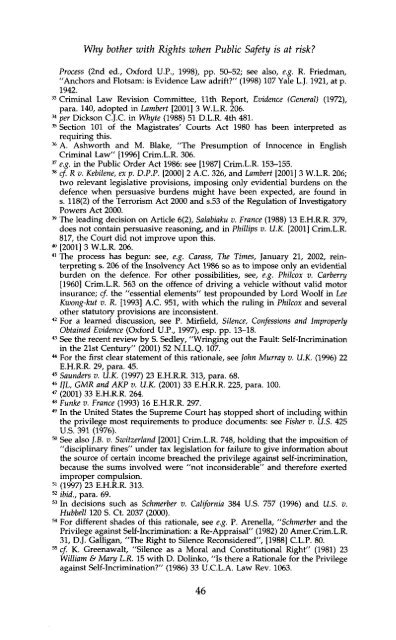Human Rights, Serious Crime and Criminal Procedure - College of ...
Human Rights, Serious Crime and Criminal Procedure - College of ...
Human Rights, Serious Crime and Criminal Procedure - College of ...
- No tags were found...
Create successful ePaper yourself
Turn your PDF publications into a flip-book with our unique Google optimized e-Paper software.
Why bother with <strong>Rights</strong> when Public Safety is at risk?Process (2nd ed., Oxford U.P., 1998), pp. 50-52; see also, e.g. R. Friedman,"Anchors <strong>and</strong> Flotsam: is Evidence Law adrift?" (1998) 107 Yale L.J. 1921, at p.1942.33 <strong>Criminal</strong> Law Revision Committee, 11th Report, Evidence (General) (1972),para. 140, adopted in Lambert [2001] 3 W.L.R. 206.34 per Dickson C.J.C. in Whyte (1988) 51 D.L.R. 4th 481.35 Section 101 <strong>of</strong> the Magistrates' Courts Act 1980 has been interpreted asrequiring this.36 A. Ashworth <strong>and</strong> M. Blake, "The Presumption <strong>of</strong> Innocence in English<strong>Criminal</strong> Law" [1996] Crim.L.R. 306.37 e.g. in the Public Order Act 1986: see [1987] Crim.L.R. 153-155.38 cf. R v. Kebilene, ex p. D.P.P. [2000] 2 A.C. 326, <strong>and</strong> Lambert [2001] 3 W.L.R. 206;two relevant legislative provisions, imposing only evidential burdens on thedefence when persuasive burdens might have been expected, are found ins. 118(2) <strong>of</strong> the Terrorism Act 2000 <strong>and</strong> s.53 <strong>of</strong> the Regulation <strong>of</strong> InvestigatoryPowers Act 2000.39 The leading decision on Article 6(2), Salabiaku v. France (1988) 13 E.H.R.R. 379,does not contain persuasive reasoning, <strong>and</strong> in Phillips v. U.K. [2001] Crim.L.R.817, the Court did not improve upon this.40 [2001] 3 W.L.R. 206.41 The process has begun: see, e.g. Carass, The Times, January 21, 2002, reinterpretings. 206 <strong>of</strong> the Insolvency Act 1986 so as to impose only an evidentialburden on the defence. For other possibilities, see, e.g. Philcox v. Carberry[1960] Crim.L.R. 563 on the <strong>of</strong>fence <strong>of</strong> driving a vehicle without valid motorinsurance; cf. the "essential elements" test propounded by Lord Woolf in LeeKwong-kut v. R. [1993] A.C. 951, with which the ruling in Philcox <strong>and</strong> severalother statutory provisions are inconsistent.42 For a learned discussion, see P. Mirfield, Silence, Confessions <strong>and</strong> ImproperlyObtained Evidence (Oxford U.P., 1997), esp. pp. 13-18.43 See the recent review by S. Sedley, "Wringing out the Fault: Self-Incriminationin the 21st Century" (2001) 52 N.I.L.Q. 107.44 For the first clear statement <strong>of</strong> this rationale, see ]ohn Murray v. U.K. (1996) 22E.H.R.R. 29, para. 45.45 Saunders v. U.K. (1997) 23 E.H.R.R. 313, para. 68.46 IJL, GMR <strong>and</strong> AKP v. U.K. (2001) 33 E.H.R.R. 225, para. 100.47 (2001) 33 E.H.R.R. 264.48 Funke v. France (1993) 16 E.H.R.R. 297.49 In the United States the Supreme Court has stopped short <strong>of</strong> including withinthe privilege most requirements to produce documents: see Fisher v. U.S. 425U.S. 391 (1976).50 See also ].B. v. Switzerl<strong>and</strong> [2001] Crim.L.R. 748, holding that the imposition <strong>of</strong>"disciplinary fines" under tax legislation for failure to give information aboutthe source <strong>of</strong> certain income breached the privilege against self-incrimination,because the sums involved were "not inconsiderable" <strong>and</strong> therefore exertedimproper compulsion.51 (1997) 23 E.H.R.R. 313.52 ibid., para. 69.53 In decisions such as Schmerber v. California 384 U.S. 757 (1996) <strong>and</strong> U.S. v.Hubbell 120 S. Ct. 2037 (2000).54 For different shades <strong>of</strong> this rationale, see e.g. P. Arenella, "Schmerber <strong>and</strong> thePrivilege against Self-Incrimination: a Re-Appraisal" (1982) 20 Amer.Crim.L.R.31, D.J. Galligan, "The Right to Silence Reconsidered", [1988] C.L.P. 80.55 cf. K. Greenawalt, "Silence as a Moral <strong>and</strong> Constitutional Right" (1981) 23William & Mary L.R. 15 with D. Dolinko, "Is there a Rationale for the Privilegeagainst Self-Incrimination?" (1986) 33 U.C.L.A. Law Rev. 1063.46
















